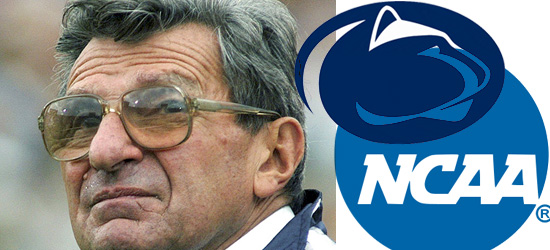The septic tank of major college athletics.
Every so often, the septic tank that is major college athletics overflows, forcing us to cover our mouths and noses lest we be overcome by the stench. So it is in the wake of revelations at Penn State University at which it is alleged, and credibly so, that over a period of years an assistant varsity football coach, now retired, sexually molested young boys both on and off the Penn State campus.
The story here is not that a pedophile turned up at a high level in a high-profile organization. That can literally happen anywhere at any time. The story is that people at the very top of Penn State University, both in the athletic department and in the university administration, knew that young boys were being molested and chose to keep it quiet.
One can guess why. A police investigation and resulting criminal trial of a Penn State coach would very possibly have negatively impacted alumni support and recruiting. And in college sports, given that the millions of dollars that are at stake have completely corrupted nearly everyone involved, these considerations trump all others.
At their best, athletics build character and teamwork and a sense of purpose for both participant and spectator. But college athletics have not been at their best in a long, long time.
College athletics as an enterprise long ago became far removed from its self-proclaimed identity as being about amateur “student athletes.” Just about every public relations communiqué that the National Collegiate Athletic Association puts out to that effect is met with derisive laughter.
Major college athletics is a multi-billion dollar industry that, more often than anyone will admit, makes a mockery of the sanctimonious mission statements of the participating universities.
On most major college campuses, particularly those in the Southeast Conference and the Big 10, the salary of the head football coach is a multiple of the president’s salary. Prior to recent revelations, if you were to ask a hundred randomly chosen people to name the president of Penn State, it is doubtful that as many as ten could have done so. But ask the name of the head coach and the name Joe Paterno would have come easily to mind.
That Penn State’s program had a pedophile in its midst is not the felony. The felony is that upon discovery of that horror, considerations other than what was right for the victims of unspeakable crimes carried the day.
This is an extreme example of a deeply embedded pathology that affects much of major college athletics. Examples are so numerous that space precludes listing them here.
But the pathology is real and it’s terrible. Put simply, very nearly any measure may be taken and any moral restraint may be swept away in pursuit of a winning program. The only imperative is to avoid getting caught and to avoid accountability for the human cost.
Let’s just examine a generic yet very common example of major college sports departing from its lofty ideals in pursuit of the victories that bring in the bucks.
Every year, in a frenzy of recruiting zeal that culminates on National Signing Day – usually the first Wednesday of February – coaches from major college football programs entice kids to play for them. Cash, cars, sex and God knows what else are passed under the table while those doing the recruiting smile and wink.
Many (but admittedly not all) of the most heavily recruited high school kids are black and come from impoverished homes and many were kept academically eligible to play high school football by a wink and a nod. But for their athletic abilities, no one would seriously consider these kids to be college material or capable of pursuing a career for which a college degree is prerequisite.
But before Labor Day, hundreds of such kids are somehow magically transformed into “student athletes” (by the NCAA’s insouciant definition of the term). A charade of a college curriculum is then cobbled together and a charade of pursuing a college degree ensues.
Recruiting an impoverished, poorly educated black kid – promising him an education while arranging his participation in a sham curriculum, broadly implying that an NFL career awaits despite overwhelmingly long odds, extracting four years of financial benefit from his God-given athletic ability, and then casting that kid aside having provided him absolutely nothing in the way of an education that will actually allow him to make a living – is morally and ethically bankrupt.
If being intellectually honest, one cannot abhor the victimization of young boys at Penn State, and be outraged by the institution’s willful blind eye, while simultaneously ignoring the all-too-common plight of our example “student athlete.”
Despite pedophilia being infinitely more appalling than crass exploitation, it is nevertheless true that in both cases the individuals involved are victims of a cosmically corrupt system.
Thus I stick by my “septic tank” metaphor.
It works.









The Penn State University cover-up of pedophilia shouldn’t come as a shock to any of us, given the recent revelations by Jack Abramoff on the corruption from inside Capitol Hill (former Washington lobbyist recently released from jail), and the new the book by Peter Schweizer, “Throw Them All Out” (how politicians and their friends get rich off insider stock tips, land deals, and cronyism that would send the rest of us to jail).
Corruption is the result of individuals that have sold their soul to the Devil in order to pursue the illicit gains of materialism (or fame) while sacrificing every ounce of character, integrity, and honor that they should otherwise possess. This is an OLD story from the beginning of Adam and Eve.
The fact that the sports and mainstream media also participate in this fraud (by creating false pop-culture heroes from the fields of sports, movies, and politicians), serve to hasten our decline as a society that is starved for virtue in the public place. In fact virtue is mocked at every turn as being old fashioned. Isn’t VIRTUE the opposite of VICE?
What is it going to take for our society to insist on total disclosure and punishment of corruption wherever it has metastasized? Let’s start with how we spend our money, exercise our votes, and talk with our friends. The era of political correctness and the rule of the elite are OVER.
So it’s not enough to give “impoverished athletically gifted” young men a free education. We must also babysit them and hand them life!?!?
The point being that these kids do NOT receive a free education. They receive a sham education. Curricula developed specifically and exclusively for “student -athletes” allows the college to put on a charade of providing a college education when in fact all the institution is doing is ensuring academic eligibility in the least challenging way possible. Such students, when eligibility is exhausted, are cast aside, no better educated than when they entered the college.
PLG
I do agree with most of your septic tank scenario. However, while you were broadcasting this evening, I was stopped dead in my tracks by the likening of a student athlete who is ill prepared for a job in the real world to a child who has been sexually abused. After reading and re-reading the transcript, I am fairly certain you did not intend to equate the two. Let me just assure you that those student athletes will not begin to face the nightmare those children will face for the rest of their lives. In my estimation, if an individual is handed the education that many struggle to afford, he/she has a personal responsibility to do something with it. I was sexually abused as a child. I worked two jobs to get myself through college. While I am fully aware that there are deep rooted problems in college athletics, there is not one part of my being that will allow me to swallow the likening of the two.
I stand by my statement in that the point is that college athletics is so profoundly corrupt that its participating institutions will act without regard to ethics or to human costs. The interests of Penn State were put ahead of what was right with respect to the abused boys. The interests of winning football and basketball programs are put ahead of what is right for a kid who, aside from athletic ability, has no business pretending to be a college student. In both cases, the morality of the institutions is called into question. The long form version of my TV commentary, which is the post to which you commented, says it succinctly in the third from last paragraph. “Despite pedophilia being dramatically more appalling than crass exploitation, it is nevertheless true that in both cases the individuals involved are victims of a cosmically corrupt system.”
Thank you for your comment.
PLG
I agree with your assessment. Abuse starts in the middle schools when coaches and administrators give star athletes a “pass” or delay in being assigned to behavioral consequences or allows them to participate in UIL events when they are academically ineligible. This commentary provides additional proof of abuse on many levels.
When a society tolerates a different standard of moral or legal conduct depending on one’s station in life, then that society is on the road to tyranny where the “rule of man” supersedes the “rule of law”. In other words, our unalienable rights can be violated with impunity so long as the perpetrator can go unpunished and without shame.
ACCOUNTABILITY is the missing thread where “equal treatment under the law” is not enforced. Examples of this corruption is all around us as we learn about malfeasance in high places whether in government, sports, media, politics, finance, science, education, manufacturing, transportation, health, religion, etc.
There are many cultures that exist on bribes and special privileges for the elite where there is every incentive to promote corruption because it “pays to do so”. Is this the kind of country that we want to become by not enforcing ACCOUNTABILITY?
It is time for good men (or women) in high and low places to root out corruption in their midst and risk their own careers to do so. We should reinstate shame and forget about toleration of evil wherever it hides. It is that important.